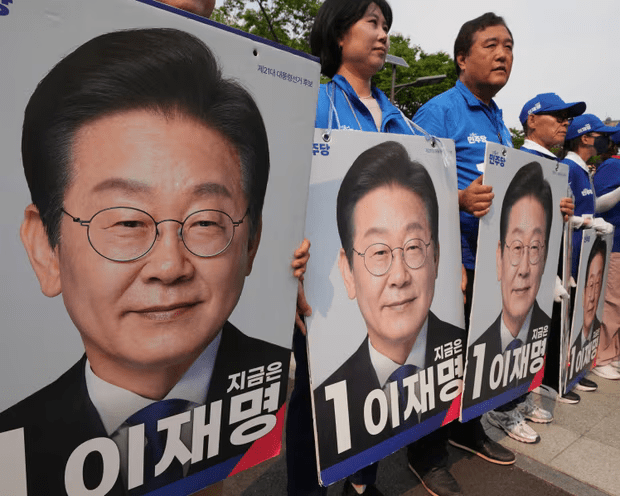
Banners showing South Korea's new president, Lee Jae-myung. Image: Lee Jin-man/AP.
(The Post News)– The 2025 South Korean presidential election has concluded, and Lee Jae-myung, who was projected to become South Korea’s next president following the results of today’s snap election, has won.
During the vote count, exit polls indicated that Lee Jae-myung of the Democratic Party was leading with approximately 51.7% of the vote. His main rival, conservative Kim Moon-soo of the People Power Party, had garnered only around 39.3%.
This election followed the impeachment of former president Yoon Suk Yeol, who was widely condemned for declaring martial law in December 2024—a move that was ruled unconstitutional by the Constitutional Court of South Korea.
Lee’s victory signals a significant political shift, marking a return to liberal leadership from former president Moon Jae-in, who left office in 2022. With a 79.4% voter turnout, this election also marked the highest turnout for a presidential race in South Korea’s democratic history.
According to the Associated Press, surveys and analysts noted that Lee’s strong performance was expected after months of political instability following Yoon’s martial law debacle. There was a broad desire for change, but Kim struggled to win over moderate swing voters.
Once sworn in, Lee is expected to face several political divisions transferred from Yoon’s term and impeachment, a slowing economy due to Trump’s trade wars, and the growing nuclear threat posed by North Korea.
Lee has built his campaign on a blend of populist appeal and economic pragmatism, appealing to both the Democratic and conservative communities. Lawmaker and politician Kim Sang-wook affirmed that “Lee Jae-myung is someone who can integrate both conservative and progressive functions with an open mind.”
Who is Lee Jae-myung?
Lee Jae-myung is a former governor of Gyeonggi Province and mayor of Seongnam. Raised in poverty, Lee began his working life as a child laborer in a factory before rising through the ranks of South Korean politics.
He is known as a radical reformer who consistently criticises South Korea’s conservative establishment while advocating for reforms to “fix the country’s deep-seated economic inequality and corruption”.
His foreign policy strategies promise a pragmatic approach that seeks to navigate the domestic economic stagnation while adapting to shifting international dynamics. Additionally, he eventually plans to ditch Yoon’s confrontational strategy when dealing with nuclear-armed North Korea’s leader, Kim Jong-un.



